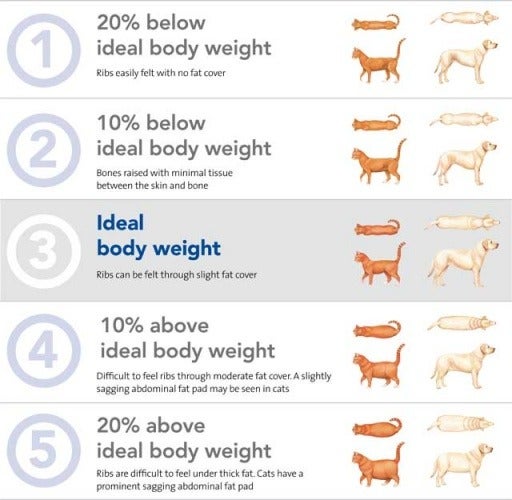How much food your dog needs
The amount of food your dog needs will largely depend on the size, breed and age of your dog, as well as how regularly it exercises. The key is to ensure you don’t overfeed or underfeed your dog. If ever you’re unsure, ask your vet to assess your dog’s diet and nutrition, and the condition of its body and overall health.
Always ensure your dog is well hydrated. This means making sure their water bowl is filled up at all times and is changed daily, so they can help themselves to water whenever they need or want.
When assessing your dog’s size and weight, it is far more important to look at their body shape than weight. You want your dog to be lean, which means you should be able to feel their ribs when you run your fingers firmly over their side and see a defined waist. If this isn’t possible, it’s diet time. Obesity in dogs is linked to decreased longevity and diseases such as osteoarthritis, and it is totally preventable.

supplied by Hill’s Prescription Diet ~ Clinical Nutrition to Improve Quality of Life
Can I Change My Dog’s Food?
It seems boring to us, but dogs get used to eating the same food every day — and so do their stomachs. Switching foods too fast can cause a problem. To change your dogs diet, blend the new food with the old over about 7-14 days, gradually giving them more of the new. But dont switch too often. It can turn your dog into a picky eater or cause weight problems.

Dogs have evolved significantly from their wolf ancestors, including developing an ability to digest starch and fat, plus living longer and healthier lives. Feeding them bones is not necessary given the range of quality nutritionally balanced diets available. Dental chews are a good alternative if you wish to provide your pet with entertainment that assists with teeth cleaning – the global Veterinary Oral Health Council lists dental products that meet standards for safety and reducing plaque/tartar.
Bones and raw meat are not recommended as they can break teeth and cause internal blockages, raw bones also carry bacteria that can make both animals and humans ill. Read the article Should I feed bones to my dog? for more information. If you do choose to offer bones to your pet, they should always be raw and introduced gradually.
Dogs may be offered fish (such as tinned fish – sardines, tuna or salmon) as an occasional treat, but fish should not be fed constantly. Take care to avoid fish bones and choose fish canned in spring water rather than oil or brine.
The following information is general advice, but as each dog is an individual, seek veterinary advice, particularly if your dog has any special dietary needs or has a reaction to a standard diet.
Also ensure your pet dog doesn’t have access to string wrappings around rolled roasts or absorbent pads found under meat when wrapped on trays.
HOW TO FEED A DOG OR PUPPY CORRECTLY How many times a day you should feed your dog
Perhaps the most common question pet owners ask their veterinarian is “What should I feed my dog?” Feeding your dog an appropriate amount of a well-balanced diet is vital to its overall health and well-being. To understand how and what to feed your dog, you need to understand what the nutritional requirements of dogs are and how these requirements have developed through the process of biological evolution.
